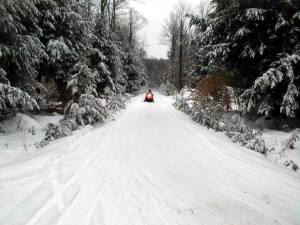
A federal judge ruled on Friday that the South Fowl snowmobile trail is legal, despite concerns about noise pollution in the Boundary Waters Canoe Area Wilderness. The trail has been the subject of legal challenges for several years, since the Superior National Forest shut down an illegal trail in the wilderness and proposed a re-route just outside it.
The trail will come within 400 feet of the wilderness boundary in some places, near Royal Lake and the Royal River. It connects two non-wilderness lakes on the Gunflint Trail, McFarland and South Fowl, which are popular for ice-fishing. The trail was included in the 1978 BWCAW Act, but it was only in 2002 that it was discovered snowmobilers were illegally using it. The Forest Service shut down the trail in a contentious move, and proposed the reroute.
A lawsuit over it was first filed in 2006, and has included delays while the Forest Service conducted extensive analysis of noise impacts. In his ruling, Judge John Tunheim wrote that the Forest Service acted appropriately, and the trail will not have a significant impact on the wilderness.
“Ultimately, the most any wilderness visitor will hear due to Alternative 2 is sound equivalent to moderate rainfall. More importantly, that impact will only occur in a small portion of the affected wilderness. Indeed, in an area that has been surrounded by snowmobile and other motorized traffic since the time it was designated as wilderness, where there are few winter visitors and the expectation of solitude is slim,” Tunheim wrote.
Wilderness advocate Kevin Proescholdt, conservation director for Montana-based Wilderness Watch, told the Star Tribune that the ruling signifies a slippery slope for the Boundary Waters. “Our fear is this will be another cut in the death of a thousand cuts to the Boundary Waters,” Proescholdt said.
Trail proponents said they were pleased with the ruling. “It just shows the common sense of the judge’s decision that there are motor noises already there that you hear in the Boundary Waters,” Nancy McReady of Conservationists with Common Sense told the Star Tribune.
The case could now be appealed to the Eighth District Court of Appeals. An attorney representing the Sierra Club Northstar Chapter, Northeastern Minnesotans for Wilderness, Wilderness Watch and the Izaak Walton League, told the Star Tribune that they are weighing their options.

